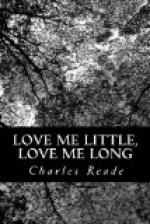“His spade, Mr. Dodd?”
“His whale-spade; it is as sharp as a razor;” and how the skipper dug a hole in the whale as big as a well and four feet deep, and, after a long search, gave a shout of triumph, and picked out some stuff that looked like Gloucester cheese; and, when he had nearly filled his basket with this stuff, he slacked the grappling-iron, and David hauled him on board, and the carcass dropped astern, and the captain sang out for rum, and drank a small tumbler neat, and would have fainted away, spite of his precautions, but for the rum, and how a heavenly perfume was now on deck fighting with that horrid odor; and how the crew smelled it, and crept timidly up one by one, and how “the Glo’ster cheese was a great favorite of yours, ladies. It was the king of perfumes—amber-gas; there is some of it in all your richest scents; and the knowing skipper had made a hundred guineas in the turn of the hand. So knowledge is wealth, you see, and the sweet can be got out of the sour by such as study nature.”
“Don’t preach, David, especially after just telling a fib. A hundred guineas!”
“I am wrong,"’ said David.
“Very wrong, indeed.”
“There were eight pounds; and he sold it at a guinea the ounce to a wholesale chemist, so that looks to me like 128 pounds.”
Then David left the whales, and encouraged by bright eyes and winning smiles, and warm questions, sang higher strains.
Ships in dire distress at sea, yet saved by God’s mercy, and the cool, invincible courage of captain and crew—great ships run ashore—the waves breaking them up—the rigging black with the despairing crew, eying the watery death that tumbled and gaped and roared for them below; and then little shore boats, manned by daring hearts, launched into the surf, and going out to the great ship and her peril, risking more life for the chance of saving life. And he did not present the bare skeletons of daring acts; those grand morgues, the journals, do that. There lie the dry bones of giant epics waiting Genius’s hand to make them live. He gave them not only the broad outward facts—the bones; but those smaller touches that are the body and soul of a story, true or false, wanting which the deeds of heroes sound an almanac; above all, he gave them glimpses, not only of what men acted, but what they felt: what passed in the hearts of men perishing at sea, in sight of land, houses, fires on the hearth, and outstretched hands, and in the hearts of the heroes that ran their boats into the surf and Death’s maw to save them, and of the lookers on, admiring, fearing, shivering, glowing, and of the women that sobbed and prayed ashore with their backs to the sea, just able to risk lover, husband, and son for the honor of manhood and the love of Christ, but not able to look on at their own flesh and blood diving so deep, and lost so long in cockle-shells between the hills of waves.
Such great acts, great feelings, great perils, and the gushes that crowned all of holy triumph when the boats came in with the dripping and saved, and man for a moment looked greater than the sea and the wind and death, this seaman poured hot from his own manly heart into quick and womanly bosoms, that heaved visibly, and glowed with admiring sympathy, and fluttered with gentle fear.




